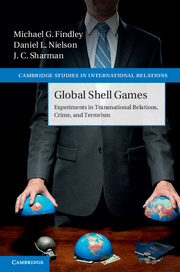Book contents
- Frontmatter
- Dedication
- Contents
- List of Figures
- List of Tables
- Preface
- 1 Introduction
- 2 Explaining the global shell game
- 3 Overall compliance, tax havens, OECD and developing countries
- 4 Terrorism and corruption
- 5 Laws and standards
- 6 Penalties, norms, and US origin
- 7 Conclusion
- Appendices
- References
- Index
6 - Penalties, norms, and US origin
Published online by Cambridge University Press: 05 June 2014
- Frontmatter
- Dedication
- Contents
- List of Figures
- List of Tables
- Preface
- 1 Introduction
- 2 Explaining the global shell game
- 3 Overall compliance, tax havens, OECD and developing countries
- 4 Terrorism and corruption
- 5 Laws and standards
- 6 Penalties, norms, and US origin
- 7 Conclusion
- Appendices
- References
- Index
Summary
In 1998 behavioral economists Uri Gneezy and Aldo Rustichini performed a now-famous experiment at ten daycare centers in Israel. Many parents at the daycares had been arriving late to pick up their children, so Gneezy and Rustichini, after a four-week observation period, imposed a fine of three dollars on late parents at six of the ten daycare centers – randomly assigned, of course. The result? The rate of late arrivals increased significantly, and the tardiness did not diminish even after the fines were removed (Gneezy and Rustichini 2000). The experiment illuminates one of the core debates in the social sciences: Do actors behave more appropriately when threatened with penalties for violating the rules or when they are normatively constrained?
Gneezy and Rustichini’s findings suggest that, before and during the observation period, parents were inclined to feel socially obligated to show up on time so that the daycare workers would not have to stay after hours to wait for them. But once a fine was imposed, it implied that tardiness could be recompensed by paying a monetary price, and it induced the unintended consequence of increased late arrivals. The threat of penalties can therefore backfire. The experiment also presents an illustration of the possibility that the effects of social norms and penalties may be more complicated than commonly assumed in international relations, especially when considering sub-national actors (March and Olsen 1998; Checkel 2001). Furthermore, this study illustrates how experiments can surprise us and confound our preconceived notions of how the world works. The experimental results presented in this chapter are similarly surprising in disconfirming many of our expectations (some derived from IR theory, others just simple intuitions) about why actors comply with or defy international rules. In some instances treatments we thought would make a big difference to compliance rates made none, whereas in other instances the effect was exactly the opposite of what we had expected.
- Type
- Chapter
- Information
- Global Shell GamesExperiments in Transnational Relations, Crime, and Terrorism, pp. 145 - 167Publisher: Cambridge University PressPrint publication year: 2014

